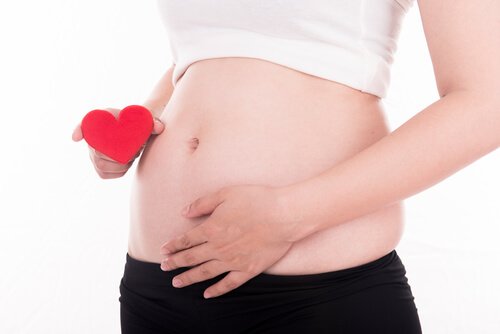How Your Body Changes During Pregnancy

Your body changes during pregnancy in many different ways. At first, you won’t feel the changes too much. Some women don’t feel any different for the first few months. However, at some point, everything starts to change.
In reality, no two pregnancies are alike. Every woman experiences her own pregnancy in a unique way. All women have some different symptoms. For example, some women constantly vomit, while others don’t feel nauseous at all.
However, hormonal and body changes always occur. These changes are necessary to keep the fetus alive and get ready for breastfeeding. It’s important to recognize everything that happens to understand your own pregnancy.
The mildest changes take place in the first trimester
First, fertilization occurs. Then, after six days, the fertilized egg attaches to the uterus. From here, the first sign of pregnancy is not getting your period. Except for this sign, many women don’t notice changes in the first month.
Things change as the second and third months go by. Your breasts start to grow and may darken a little. Nausea and increased vaginal discharge are symptoms that women often confuse with PMS.
However, if you look closely, your uterus can grow. Some women may actually feel it. In this first stage, some women notice some emotional changes. Stress, anxiety and sudden mood swings emerge little by little. This is why women may confuse it with their menstrual cycle.

Second trimester: changes are more noticeable
From the third to sixth month, many women don’t notice a lot of weight gain. In general, they gain about eight or ten pounds, although this depends on their diet. The sensation of cravings will contribute to this weight gain.
Women experience pregnant chloasma, which consists of small yellowish spots on their skin. You can also see a black line under their abdomen. Sometimes, they also start to produce colostrum early.
Colostrum is a yellow substance that the mammary glands give off before breastmilk appears. Another effect of this period is the appearance of Braxton-Hicks contractions. These are usually painless and happen very sporadically.
The last trimester and weeks before delivery
Although many women feel the first movements in their uterus at the end of their second trimester, they happen more frequently in the third trimester. The last weeks, the baby will be very big and active. Therefore, the baby’s kicks can hurt.
While it may seem like you gain more weight, at this stage, women gain about ten to twelve pounds. Women get more nervous, usually because they know they’ll go into labor soon.
It’s also normal to notice stretch marks on your stomach, hips and breasts. This is because your skin is more stretched than ever. In addition, the increased size of the uterus can cause circulation issues. Also, it can cause fluid buildup in your legs.
“In reality, no two pregnancies are alike. Every woman experiences her own pregnancy in a unique way. All women have some differences in their symptoms.”
Hormonal changes in your body during pregnancy
From the moment sperm comes in contact with the egg, hormonal changes start. In the beginning, women experience a sharp estrogen increase.
In fact, hormonal changes happen every minute. The placenta starts to produce the chorionic gonadotropin hormone. By the tenth week, the placental lactogen starts appearing. This is a central hormone substance in the fetus’s development.
However, many of the bodily changes that women experience during pregnancy are made by estrogen. It’s very important to prepare their mammary glands. Your body adapts during pregnancy to keep the fetus safe.

Psychological changes during pregnancy
Your body changes during pregnancy, and your mind does too. In the beginning, you can experience similar mood swings to your period. Hormonal changes also make you feel different.
From the third to sixth month, what most mothers worry about is keeping their baby safe. In fact, some cravings may have a psychological root. In addition, social pressure can also be a factor.
During the last three months, you can experience what’s called “nesting.” Many mothers start to become obsessed with cleaning and preparing the home for the baby. The important thing is to prepare yourself by knowing that everything will change.
Your body changes during pregnancy in many different ways. At first, you won’t feel the changes too much. Some women don’t feel any different for the first few months. However, at some point, everything starts to change.
In reality, no two pregnancies are alike. Every woman experiences her own pregnancy in a unique way. All women have some different symptoms. For example, some women constantly vomit, while others don’t feel nauseous at all.
However, hormonal and body changes always occur. These changes are necessary to keep the fetus alive and get ready for breastfeeding. It’s important to recognize everything that happens to understand your own pregnancy.
The mildest changes take place in the first trimester
First, fertilization occurs. Then, after six days, the fertilized egg attaches to the uterus. From here, the first sign of pregnancy is not getting your period. Except for this sign, many women don’t notice changes in the first month.
Things change as the second and third months go by. Your breasts start to grow and may darken a little. Nausea and increased vaginal discharge are symptoms that women often confuse with PMS.
However, if you look closely, your uterus can grow. Some women may actually feel it. In this first stage, some women notice some emotional changes. Stress, anxiety and sudden mood swings emerge little by little. This is why women may confuse it with their menstrual cycle.

Second trimester: changes are more noticeable
From the third to sixth month, many women don’t notice a lot of weight gain. In general, they gain about eight or ten pounds, although this depends on their diet. The sensation of cravings will contribute to this weight gain.
Women experience pregnant chloasma, which consists of small yellowish spots on their skin. You can also see a black line under their abdomen. Sometimes, they also start to produce colostrum early.
Colostrum is a yellow substance that the mammary glands give off before breastmilk appears. Another effect of this period is the appearance of Braxton-Hicks contractions. These are usually painless and happen very sporadically.
The last trimester and weeks before delivery
Although many women feel the first movements in their uterus at the end of their second trimester, they happen more frequently in the third trimester. The last weeks, the baby will be very big and active. Therefore, the baby’s kicks can hurt.
While it may seem like you gain more weight, at this stage, women gain about ten to twelve pounds. Women get more nervous, usually because they know they’ll go into labor soon.
It’s also normal to notice stretch marks on your stomach, hips and breasts. This is because your skin is more stretched than ever. In addition, the increased size of the uterus can cause circulation issues. Also, it can cause fluid buildup in your legs.
“In reality, no two pregnancies are alike. Every woman experiences her own pregnancy in a unique way. All women have some differences in their symptoms.”
Hormonal changes in your body during pregnancy
From the moment sperm comes in contact with the egg, hormonal changes start. In the beginning, women experience a sharp estrogen increase.
In fact, hormonal changes happen every minute. The placenta starts to produce the chorionic gonadotropin hormone. By the tenth week, the placental lactogen starts appearing. This is a central hormone substance in the fetus’s development.
However, many of the bodily changes that women experience during pregnancy are made by estrogen. It’s very important to prepare their mammary glands. Your body adapts during pregnancy to keep the fetus safe.

Psychological changes during pregnancy
Your body changes during pregnancy, and your mind does too. In the beginning, you can experience similar mood swings to your period. Hormonal changes also make you feel different.
From the third to sixth month, what most mothers worry about is keeping their baby safe. In fact, some cravings may have a psychological root. In addition, social pressure can also be a factor.
During the last three months, you can experience what’s called “nesting.” Many mothers start to become obsessed with cleaning and preparing the home for the baby. The important thing is to prepare yourself by knowing that everything will change.
This text is provided for informational purposes only and does not replace consultation with a professional. If in doubt, consult your specialist.








